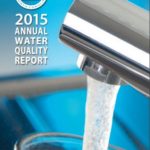The City of Asheville has released its 18th annual Water Quality Report, a federally-mandated “report card” designed to educate customers on what is in their drinking water. The City of Asheville is pleased to report that the city’s drinking water continues to surpass all U.S. Environmental Protection Agency (EPA) Safe Drinking Water Standards. The report is available on the City of Asheville Water Resources webpage.
The report provides details about water quality as well as where the water comes from and how it is treated. Customers will be receiving the report in their next water bills and may expect an update of this report each year.
“I am proud of this Water Quality Report and the employees who work hard to ensure that our customers receive excellent water quality every day,” said Jade Dundas, Director of the Water Resources Department. “Congress and the EPA have mandated this report and, to a large extent, its format and content. The EPA wants to be sure every community knows what is in its drinking water. The City of Asheville Water Resources Department agrees. The Water Quality Report will increase our customers’ understanding of and confidence in the quality of their water supply and ongoing efforts to maintain the highest standards possible.”
It’s easy to see why City of Asheville drinking water is considered some of the finest available anywhere in the United States. Our primary source of water is located in Black Mountain in eastern Buncombe County where the water flows from pure mountain springs and streams into lakes known as the North Fork and Bee Tree Reservoirs. They are located in Black Mountain and Swannanoa, respectively. These pristine lakes are surrounded by 20,000 acres of highly protected mountain forests owned by the City of Asheville.
The City of Asheville is proud of the exceptional quality of water that flows through our system to your household or business daily. To enhance its quality, we treat it very carefully at our state-of-the-art water treatment plants.
The 2015 Water Quality Report also addresses issues of copper and lead pipes, foremost in the public’s mind following the Flint, Mich., water situation.
The primary source of lead and copper in tap water is in a customer’s home plumbing system.
To prevent corrosion from occurring, the City of Asheville has effectively implemented a system-wide corrosion control treatment.
It’s also notable that the City of Asheville Water Resources Department was the first water utility in North Carolina to start installing lead-free brass fittings.
For more information or copies of the City of Asheville’s 2015 Annual Water Quality Report, call the City of Asheville Customer Services Division at 828-251-1122.
Related coverage:
Keeping Asheville’s water supply safe: Testing, constant monitoring are key

